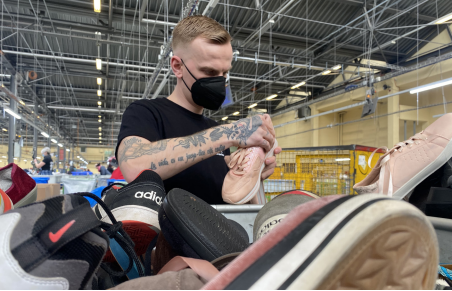
Ahrensburg, June 2023. Until now, Mercedes-Benz had only one solution for discarded safety shoes: the incineration plant. Up to now, around 25 tonnes of shoes have been destroyed every year at one of the automotive company‘s plants. The SOEX Group now wants to change this and will recycle the worn shoes for Mercedes-Benz AG. A pilot project between the SOEX Group and Mercedes-Benz AG started in May. The discarded safety shoes will be collected in a total of six containers on the Mercedes-Benz factory in Sindelfingen and then recycled at the SOEX plant in Wolfen.
As a certified recycling company, SOEX operates the world‘s first shoe recycling plant which is still unrivalled in the industry. With the help of this plant, valuable resources such as rubber, le- ather and metal can be saved and shoes can be prepared for reuse. In this way, the SOEX Group and Mercedes-Benz AG will jointly save 25,000 pairs of safety shoes from incineration every year. Since May, Mereceds-Benz has therefore been urging its employees in Sindelfingen: „Give your discarded safety shoes the chance now to escape incineration and be recycled as materials for new products – make the right throw!“
22 billion pairs of shoes are produced worldwide eve- ry year. Calculations show that the global footwear in- dustry produces as much CO2 annually as the whole of Germany. This is also since a lot of resources are used to produce shoes, which are not returned to the cycle after use, but are wasted: The majority of shoes are disposed of in residual waste after wearing and end up in incineration; not even five percent are collected and recycled. Before SOEX put the world‘s first shoe recyc- ling plant into operation at its factory in Wolfen, recyc- ling shoes was even considered impossible worldwide. This is because usually more than 40 materials are so firmly glued together in shoes that they can hardly be separated.
But the SOEX Group made sure that leather and rubber no longer ended up in the rubbish in masses and, to- gether with its English partner In-Cycle and the French company Eco TLC, developed the appropriate plant. Together they revolutionised shoe recycling. In the plant, zip scraps, metal parts, leather, rubber and fabric scraps are carefully separated from each other and can then be reused as raw mate- rial for the manufacture of other products.
Now the car manufacturer Mercedes-Benz AG is also benefiting from the industry breakthrough in shoe recycling. The advantage of recycling safety shoes is also that a safety shoe consists of only four components and the effort required to separate them is therefore very low. SOEX and Mercedes-Benz AG have thus found a simple but sustainable solution to dispose of work shoes sensibly and give them a second life. The result: a valuable contribution to the reduction of leather and rubber waste and the relief of the environment by recovering new resources from old ones.
With their joint pilot project, SOEX and Mercedes-Benz AG are setting an example that could be followed by other Mercedes-Benz plants and that sets an indicator for the sustainable recycling of safety footwear beyond the automotive industry.
About SOEX Group
The SOEX Group is a worldwide specialist service provider in the collection, sorting, re-use and recycling of used textiles and footwear. The collected items are sorted and graded in certified operations, following the international waste hierarchy: reuse is preferred over recycling. Its research with partners for new solutions makes SOEX unique in the industry. The goal of SOEX is to maximize recycling following its zero waste philosophy.
About Mercedes-Benz
Mercedes-Benz Group AG (formerly Daimler AG) is one of the most successful automotive companies in the world. Mercedes-Benz AG is one of the largest suppliers of premium and luxury cars and vans. In the spirit of sustainability, Mercedes-Benz Group AG aims to create lasting value for all stakeholders: for customers, employees and investors as well as for business partners and society as a whole.
Contact
Patricia Hagelstein
